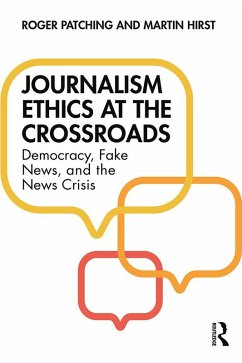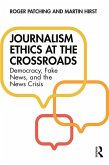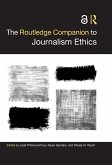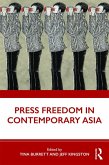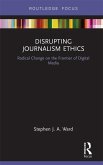Roger Patching, Martin Hirst
Journalism Ethics at the Crossroads (eBook, ePUB)
Democracy, Fake News, and the News Crisis
36,95 €
36,95 €
inkl. MwSt.
Sofort per Download lieferbar

18 °P sammeln
36,95 €
Als Download kaufen

36,95 €
inkl. MwSt.
Sofort per Download lieferbar

18 °P sammeln
Jetzt verschenken
Alle Infos zum eBook verschenken
36,95 €
inkl. MwSt.
Sofort per Download lieferbar
Alle Infos zum eBook verschenken

18 °P sammeln
Roger Patching, Martin Hirst
Journalism Ethics at the Crossroads (eBook, ePUB)
Democracy, Fake News, and the News Crisis
- Format: ePub
- Merkliste
- Auf die Merkliste
- Bewerten Bewerten
- Teilen
- Produkt teilen
- Produkterinnerung
- Produkterinnerung

Bitte loggen Sie sich zunächst in Ihr Kundenkonto ein oder registrieren Sie sich bei
bücher.de, um das eBook-Abo tolino select nutzen zu können.
Hier können Sie sich einloggen
Hier können Sie sich einloggen
Sie sind bereits eingeloggt. Klicken Sie auf 2. tolino select Abo, um fortzufahren.

Bitte loggen Sie sich zunächst in Ihr Kundenkonto ein oder registrieren Sie sich bei bücher.de, um das eBook-Abo tolino select nutzen zu können.
This book provides journalism students with an easy-to-read yet theoretically rich guide to the dialectics, contradictions, problems, and promises encapsulated in the term 'journalism ethics'.
.
- Geräte: eReader
- mit Kopierschutz
- eBook Hilfe
Andere Kunden interessierten sich auch für
![Journalism Ethics at the Crossroads (eBook, PDF) Journalism Ethics at the Crossroads (eBook, PDF)]() Roger PatchingJournalism Ethics at the Crossroads (eBook, PDF)36,95 €
Roger PatchingJournalism Ethics at the Crossroads (eBook, PDF)36,95 €![Global Media Ethics and the Digital Revolution (eBook, ePUB) Global Media Ethics and the Digital Revolution (eBook, ePUB)]() Global Media Ethics and the Digital Revolution (eBook, ePUB)42,95 €
Global Media Ethics and the Digital Revolution (eBook, ePUB)42,95 €![The Routledge Companion to Journalism Ethics (eBook, ePUB) The Routledge Companion to Journalism Ethics (eBook, ePUB)]() The Routledge Companion to Journalism Ethics (eBook, ePUB)46,95 €
The Routledge Companion to Journalism Ethics (eBook, ePUB)46,95 €![Press Freedom in Contemporary Asia (eBook, ePUB) Press Freedom in Contemporary Asia (eBook, ePUB)]() Press Freedom in Contemporary Asia (eBook, ePUB)39,95 €
Press Freedom in Contemporary Asia (eBook, ePUB)39,95 €![America First (eBook, ePUB) America First (eBook, ePUB)]() America First (eBook, ePUB)26,95 €
America First (eBook, ePUB)26,95 €![The Routledge Companion to World Literary Journalism (eBook, ePUB) The Routledge Companion to World Literary Journalism (eBook, ePUB)]() The Routledge Companion to World Literary Journalism (eBook, ePUB)46,95 €
The Routledge Companion to World Literary Journalism (eBook, ePUB)46,95 €![Disrupting Journalism Ethics (eBook, ePUB) Disrupting Journalism Ethics (eBook, ePUB)]() Stephen J A WardDisrupting Journalism Ethics (eBook, ePUB)21,95 €
Stephen J A WardDisrupting Journalism Ethics (eBook, ePUB)21,95 €-
-
-
This book provides journalism students with an easy-to-read yet theoretically rich guide to the dialectics, contradictions, problems, and promises encapsulated in the term 'journalism ethics'.
.
.
Dieser Download kann aus rechtlichen Gründen nur mit Rechnungsadresse in A, B, BG, CY, CZ, D, DK, EW, E, FIN, F, GR, HR, H, IRL, I, LT, L, LR, M, NL, PL, P, R, S, SLO, SK ausgeliefert werden.
Produktdetails
- Produktdetails
- Verlag: Taylor & Francis eBooks
- Seitenzahl: 308
- Erscheinungstermin: 30. September 2021
- Englisch
- ISBN-13: 9780429516047
- Artikelnr.: 62463191
- Verlag: Taylor & Francis eBooks
- Seitenzahl: 308
- Erscheinungstermin: 30. September 2021
- Englisch
- ISBN-13: 9780429516047
- Artikelnr.: 62463191
- Herstellerkennzeichnung Die Herstellerinformationen sind derzeit nicht verfügbar.
Roger Patching has spent more than half a century as a journalist and a journalism educator. He worked for nearly 20 years in daily journalism for a newspaper, radio station, and TV station in Adelaide, South Australia, before moving to Sydney to work for the international media wire service Australian Associated Press, followed by a decade with the national broadcaster ABC in Brisbane. Then followed more than 30 years at various Australian universities, teaching broadcast journalism, sports reporting, and ethics. He is a life member of the national journalism educators' association JERAA. Roger has co-authored nine journalism texts. This is his fourth collaboration with Dr Hirst.
Martin Hirst is a founding director of the Centre for Journalism, Media and Democracy at AUT University in Auckland, NZ, and co-editor of the journal Political Economy of Communication, published by the International Association for Media and Communication Research. Martin is the author of News 2.0 (Allen & Unwin 2011) and Navigating Social Journalism (Routledge 2018). He has collaborated with other writers on From Broadcast to Narrowcast: Communication and New Media (Oxford 2007), Scooped: The Politics and Power of Journalism in Aotearoa New Zealand (AUT Press 2012), and So You Want to Be a Journalist (Cambridge 2012). Martin spent 20 years in journalism and a similar number of years in academia. He now writes and paints from his studio in Melbourne.
Martin Hirst is a founding director of the Centre for Journalism, Media and Democracy at AUT University in Auckland, NZ, and co-editor of the journal Political Economy of Communication, published by the International Association for Media and Communication Research. Martin is the author of News 2.0 (Allen & Unwin 2011) and Navigating Social Journalism (Routledge 2018). He has collaborated with other writers on From Broadcast to Narrowcast: Communication and New Media (Oxford 2007), Scooped: The Politics and Power of Journalism in Aotearoa New Zealand (AUT Press 2012), and So You Want to Be a Journalist (Cambridge 2012). Martin spent 20 years in journalism and a similar number of years in academia. He now writes and paints from his studio in Melbourne.
Preface: Not the book we started with
Introduction: Ethics, Trust and the Crisis of Journalism
Chapter 1: News in Crisis: Responding to the Pandemic
Chapter 2: News in Crisis: Responding to Black Lives Matter
Chapter 3: News in Crisis: The Fake news crisis
Chapter 4: News in crisis: Digital Disruption
Chapter 5: News in Crisis: The economic collapse of the news industry
Chapter 6: The crisis of legitimacy
Chapter 7: Journalism and social media: An ethical minefield?
Chapter 8: Is it time to abandon privacy?
Chapter 9: Dubious methods
Chapter 10: The importance of whistleblowers and source protection
Chapter 11: Journalism under threat
Chapter 12: Journalism, ethics and philosophy
Chapter 13: A crisis in epistemology and ideology
Chapter 14: (Re)introducing the dialectic: Hegel and Merrill
Chapter 15: 'Standing Merrill on his feet': Journalism and materialism
Chapter 16: Dialectic in action: Revisiting key issues in ethics
Chapter 17: Rebuilding trust in journalism: An ethical imperative
Bibliography
Index
Introduction: Ethics, Trust and the Crisis of Journalism
Chapter 1: News in Crisis: Responding to the Pandemic
Chapter 2: News in Crisis: Responding to Black Lives Matter
Chapter 3: News in Crisis: The Fake news crisis
Chapter 4: News in crisis: Digital Disruption
Chapter 5: News in Crisis: The economic collapse of the news industry
Chapter 6: The crisis of legitimacy
Chapter 7: Journalism and social media: An ethical minefield?
Chapter 8: Is it time to abandon privacy?
Chapter 9: Dubious methods
Chapter 10: The importance of whistleblowers and source protection
Chapter 11: Journalism under threat
Chapter 12: Journalism, ethics and philosophy
Chapter 13: A crisis in epistemology and ideology
Chapter 14: (Re)introducing the dialectic: Hegel and Merrill
Chapter 15: 'Standing Merrill on his feet': Journalism and materialism
Chapter 16: Dialectic in action: Revisiting key issues in ethics
Chapter 17: Rebuilding trust in journalism: An ethical imperative
Bibliography
Index
Preface: Not the book we started with
Introduction: Ethics, Trust and the Crisis of Journalism
Chapter 1: News in Crisis: Responding to the Pandemic
Chapter 2: News in Crisis: Responding to Black Lives Matter
Chapter 3: News in Crisis: The Fake news crisis
Chapter 4: News in crisis: Digital Disruption
Chapter 5: News in Crisis: The economic collapse of the news industry
Chapter 6: The crisis of legitimacy
Chapter 7: Journalism and social media: An ethical minefield?
Chapter 8: Is it time to abandon privacy?
Chapter 9: Dubious methods
Chapter 10: The importance of whistleblowers and source protection
Chapter 11: Journalism under threat
Chapter 12: Journalism, ethics and philosophy
Chapter 13: A crisis in epistemology and ideology
Chapter 14: (Re)introducing the dialectic: Hegel and Merrill
Chapter 15: 'Standing Merrill on his feet': Journalism and materialism
Chapter 16: Dialectic in action: Revisiting key issues in ethics
Chapter 17: Rebuilding trust in journalism: An ethical imperative
Bibliography
Index
Introduction: Ethics, Trust and the Crisis of Journalism
Chapter 1: News in Crisis: Responding to the Pandemic
Chapter 2: News in Crisis: Responding to Black Lives Matter
Chapter 3: News in Crisis: The Fake news crisis
Chapter 4: News in crisis: Digital Disruption
Chapter 5: News in Crisis: The economic collapse of the news industry
Chapter 6: The crisis of legitimacy
Chapter 7: Journalism and social media: An ethical minefield?
Chapter 8: Is it time to abandon privacy?
Chapter 9: Dubious methods
Chapter 10: The importance of whistleblowers and source protection
Chapter 11: Journalism under threat
Chapter 12: Journalism, ethics and philosophy
Chapter 13: A crisis in epistemology and ideology
Chapter 14: (Re)introducing the dialectic: Hegel and Merrill
Chapter 15: 'Standing Merrill on his feet': Journalism and materialism
Chapter 16: Dialectic in action: Revisiting key issues in ethics
Chapter 17: Rebuilding trust in journalism: An ethical imperative
Bibliography
Index
Preface: Not the book we started with
Introduction: Ethics, Trust and the Crisis of Journalism
Chapter 1: News in Crisis: Responding to the Pandemic
Chapter 2: News in Crisis: Responding to Black Lives Matter
Chapter 3: News in Crisis: The Fake news crisis
Chapter 4: News in crisis: Digital Disruption
Chapter 5: News in Crisis: The economic collapse of the news industry
Chapter 6: The crisis of legitimacy
Chapter 7: Journalism and social media: An ethical minefield?
Chapter 8: Is it time to abandon privacy?
Chapter 9: Dubious methods
Chapter 10: The importance of whistleblowers and source protection
Chapter 11: Journalism under threat
Chapter 12: Journalism, ethics and philosophy
Chapter 13: A crisis in epistemology and ideology
Chapter 14: (Re)introducing the dialectic: Hegel and Merrill
Chapter 15: 'Standing Merrill on his feet': Journalism and materialism
Chapter 16: Dialectic in action: Revisiting key issues in ethics
Chapter 17: Rebuilding trust in journalism: An ethical imperative
Bibliography
Index
Introduction: Ethics, Trust and the Crisis of Journalism
Chapter 1: News in Crisis: Responding to the Pandemic
Chapter 2: News in Crisis: Responding to Black Lives Matter
Chapter 3: News in Crisis: The Fake news crisis
Chapter 4: News in crisis: Digital Disruption
Chapter 5: News in Crisis: The economic collapse of the news industry
Chapter 6: The crisis of legitimacy
Chapter 7: Journalism and social media: An ethical minefield?
Chapter 8: Is it time to abandon privacy?
Chapter 9: Dubious methods
Chapter 10: The importance of whistleblowers and source protection
Chapter 11: Journalism under threat
Chapter 12: Journalism, ethics and philosophy
Chapter 13: A crisis in epistemology and ideology
Chapter 14: (Re)introducing the dialectic: Hegel and Merrill
Chapter 15: 'Standing Merrill on his feet': Journalism and materialism
Chapter 16: Dialectic in action: Revisiting key issues in ethics
Chapter 17: Rebuilding trust in journalism: An ethical imperative
Bibliography
Index
Preface: Not the book we started with
Introduction: Ethics, Trust and the Crisis of Journalism
Chapter 1: News in Crisis: Responding to the Pandemic
Chapter 2: News in Crisis: Responding to Black Lives Matter
Chapter 3: News in Crisis: The Fake news crisis
Chapter 4: News in crisis: Digital Disruption
Chapter 5: News in Crisis: The economic collapse of the news industry
Chapter 6: The crisis of legitimacy
Chapter 7: Journalism and social media: An ethical minefield?
Chapter 8: Is it time to abandon privacy?
Chapter 9: Dubious methods
Chapter 10: The importance of whistleblowers and source protection
Chapter 11: Journalism under threat
Chapter 12: Journalism, ethics and philosophy
Chapter 13: A crisis in epistemology and ideology
Chapter 14: (Re)introducing the dialectic: Hegel and Merrill
Chapter 15: 'Standing Merrill on his feet': Journalism and materialism
Chapter 16: Dialectic in action: Revisiting key issues in ethics
Chapter 17: Rebuilding trust in journalism: An ethical imperative
Bibliography
Index
Introduction: Ethics, Trust and the Crisis of Journalism
Chapter 1: News in Crisis: Responding to the Pandemic
Chapter 2: News in Crisis: Responding to Black Lives Matter
Chapter 3: News in Crisis: The Fake news crisis
Chapter 4: News in crisis: Digital Disruption
Chapter 5: News in Crisis: The economic collapse of the news industry
Chapter 6: The crisis of legitimacy
Chapter 7: Journalism and social media: An ethical minefield?
Chapter 8: Is it time to abandon privacy?
Chapter 9: Dubious methods
Chapter 10: The importance of whistleblowers and source protection
Chapter 11: Journalism under threat
Chapter 12: Journalism, ethics and philosophy
Chapter 13: A crisis in epistemology and ideology
Chapter 14: (Re)introducing the dialectic: Hegel and Merrill
Chapter 15: 'Standing Merrill on his feet': Journalism and materialism
Chapter 16: Dialectic in action: Revisiting key issues in ethics
Chapter 17: Rebuilding trust in journalism: An ethical imperative
Bibliography
Index
